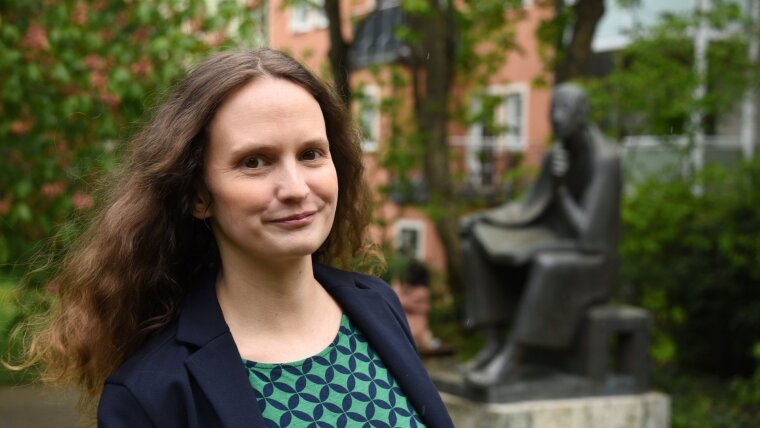
- Awards and Personnel
Published: | By: Axel Burchardt
The mathematician and philosopher Friedrich Ludwig Gottlob Frege (*1848) has accompanied and fascinated Prof. Dr Tabea Rohr from the University of Jena since her studies. The new Junior Professor of Philosophy (with tenure track) specializing in logic is therefore planning to honour the 100th anniversary of Frege's death next year with a conference in Jena. That this is already possible now, in her first semester as a professor at the University of Jena, is also due to the fact that Tabea Rohr has known the University for a long time.
Tabea Rohr, who had chosen physics and maths as her advanced courses at the Goethe-Gymnasium in Demmin (Mecklenburg-Western Pomerania), came across Frege during her first semester of studying philosophy at Friedrich Schiller University. In her search for clarity in philosophy, which began at that time and continues to this day, she encountered this "consistent, stubborn thinker", the father of analytical philosophy. She completed her doctorate on "Frege's Concept of Logic" in Jena in 2018. His ability to think and his attempts to formulate things as clearly as possible also reflect how the new philosophy professor sees herself. "My goal is always to make philosophy understandable," says Rohr. For her, this includes clear language, because speaking determines thinking. The original idea of analytical philosophy was to "present good philosophy in simple language".
Logic helps to rule out bad arguments
The 35-year-old married mother of a ten-year-old son also wants to convey this to her students. She wants them to get a feel for what philosophy is – that it is about exchanging arguments and not about telling stories. This is why logic is so important to Tabea Rohr. "Because we have to argue in philosophy and logic helps us to distinguish bad arguments from good ones." Perhaps this is also one reason why the young scientist likes to combine philosophy with mathematics.
The philosophy of pathematics is a topic that she has been researching for a long time and that Rohr will continue to pursue in Jena. A simple equation such as 2+2=4 contains many starting points for questions from a philosophical point of view, says Rohr, naming a few examples: How do we know that this equation is true and why is this knowledge seemingly so certain? What is this statement about? About numbers? But what exactly are numbers? Are they things that exist independently of us?
Political and social contexts influence mathematics
During her years as a visiting researcher and postdoc in Nancy and Paris, she also pursued such questions from a mathematics-historical perspective. She has studied the fact that different methods of proof were favoured in mathematics at different times. In the light of this interest, she has specifically focussed on French and German geometers of the 19th century. At that time, there was a methodological dispute between analysts – whose proofs consisted only of abstract formulas – and synthetics – who also relied on visualization, for example by referring to figures in their proofs.
Another research project centred on the question of how such methodological issues in mathematics are shaped by political and social contexts. Tabea Rohr specifically researched how the synthetic style of doing geometry became fashionable again during the French Revolution, although analytical geometry had been considered the only real thing in the decades before. She will also be working on such methodological issues in mathematics in Jena. Her current research focusses on the relationship between David Hilbert and Henri Poincaré – a German and a French mathematician who were both regarded as the best mathematicians in their respective countries around 1900.
Tabea Rohr feels very lucky to have found a professorship in Germany so quickly. "Unlike in France, my topics are quite unusual here."